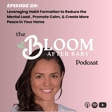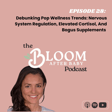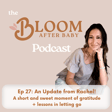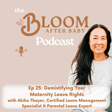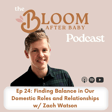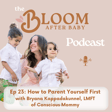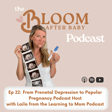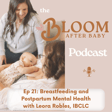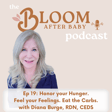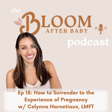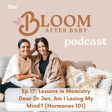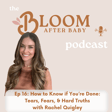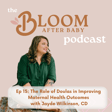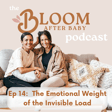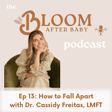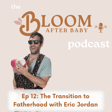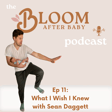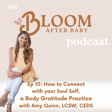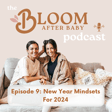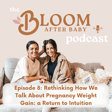Podcast Introduction
00:00:02
Speaker
You're listening to Bloom After Baby, the podcast. We're your hosts, Rachel Daggett and Jen Jordan. We're a therapist and a doctor and both moms of two.
Tailored Mental Health for Moms
00:00:13
Speaker
We're here to discuss the mental health and wellness needs that are unique to motherhood. From confusing hormone swings to your expanding body to boundaries in tricky relationships, we'll give you the information you need to experience motherhood in a way that feels good to you.
00:00:30
Speaker
Thanks so much for tuning in. Let's get to it.
Guest Introduction: Dr. Greer Kirschenbaum
00:00:36
Speaker
Hello, welcome back to the Bloom After Baby podcast. We are so excited about our guest today. Today, we are speaking with Dr. Greer Kirschenbaum. Dr. Kirschenbaum is a neuroscientist, doula, an infant and family sleep specialist, a parent, and author of The Nurture Revolution.
Understanding Nurture Science
00:00:54
Speaker
She's one of the leading voices in nurtured parenting and is helping to share some of the most important research and findings in nurture science from the past few decades. Before we dive in today, I want to provide a few definitions and backgrounds that I think will be relevant to the conversation.
00:01:11
Speaker
First of all, nurture parenting might be a new concept to people or a new phrase to many of you. On the one hand, we often think of nurture as kind of simply the innate or instinctual aspects of parenting, which is in part true. Nurture parenting emphasizes responsive and supportive caregiving. It's compassionate and empathetic. And it's also about co-regulation and tuning into our baby's needs during the period of infancy when their brains are not yet
00:01:40
Speaker
capable of regulating their own stress responses. In today's episode, Dr.
Critique of Current Parenting Methods
00:01:46
Speaker
Kirshaman will explain how many of our current popular sleep training methods and parenting strategies are rooted in convenience or meeting expectations of external forces having to do with our lifestyles and our schedules and ultimately inhibit some of our nurturing instincts and behaviors. In parenthood, especially in motherhood,
00:02:07
Speaker
Hormone shifts drive, brain changes, brain changes alter our thoughts and behaviors, and nurtured parenting harmonizes with those biological changes that are meant to be adaptive. For example, holding baby as long as you want, coming when they cry, co-sleeping, flexible schedules, as opposed to many of the modern sleep and parenting methods that resist some of those things. So in a lot of ways, nurtured parenting is really brave and takes a lot of conviction because the way our society is currently structured.
00:02:37
Speaker
that nurtured parenting isn't always the most convenient method. So how do we create a nurturing bond?
Defining Nurtured Presence and Empathy
00:02:44
Speaker
Dr. Christian Baum describes two core concepts that are foundational to nurture, what she calls nurturing presence and nurtured empathy. Nurtured presence is about seeing our baby not as an object, but as a human being that exists in a relationship. She explains that nurtured presence is not something for us as parents to do, it's a way of being in a relationship.
00:03:07
Speaker
and nurtured empathy is about teaching our babies to navigate emotions, needs, thoughts, behaviors. It's an alternative to behavior-based parenting. It's helping your baby tune inward and building our child's brain towards self-awareness, self-regulation of their own internal states. Also note, nurtured parenting particularly focuses on the first three years of a child's life based on infancy being defined as zero through three years.
00:03:35
Speaker
So hopefully that background is helpful.
Impact on Brain Development and Mental Health
00:03:37
Speaker
In today's discussion, we'll dive deeper into the benefits of nurtured parenting for baby, how it impacts their brain development, resilience, and lifelong mental health. And we talk about the parent side of it today, too, and how nurture relationships impact your parental brain and nervous system changes during the early stages of parenthood. So stick around. This combo is such a good one and an important one for you and your baby.
00:04:03
Speaker
So without further ado, here's Dr. Kirschenbaum on the Nurture Revolution. Rachel, we'll go ahead and kick us off. But thank you so much for joining us. It really means a lot. We've admired everything you're doing from afar, from social media, from reading your book, from all the other podcasts you've been on. And we're just so grateful for your time. Thank you. Yeah, thank you. I haven't been on a podcast in a while, and I love acting.
00:04:33
Speaker
more people in the space and more communities. It's one of the best parts of this.
00:04:39
Speaker
Yeah, and Jen and I were just chatting before you came on about your book and how game-changing it felt for us on a parenting level. And I was sharing with her that I studied a lot of Dan Siegel in grad school and from the attachment perspective. And reading your book felt like reading a combination of the neuroscience
00:05:04
Speaker
and evidence and research from Dan Siegel combined with the maternal nurturing personability of Brene Brown, like the combination of my two favorite professionals and people
Dr. Kirschenbaum's Personal Journey
00:05:18
Speaker
to learn from. So I just so appreciated everything in your book from your personal story and your own vulnerability and then all the amazing learnings from your research and your work in the field.
00:05:32
Speaker
They're both huge inspirations to me too. Well, that's very nice. Yeah. Oh, good. So I just want to start with, I'm going to read a little excerpt from the intro of your books. And then afterwards, if you're okay with it, we'd love for you to tell our listeners just a Cliff Notes version of your personal story because it is so moving and so relatable and so beautiful. So this is in the intro of your book.
00:06:01
Speaker
I knew that I was going to use every second I could of my son's infancy, day and night, to buffer the effects of the early stress he and I experienced and to build his brain as strong as possible with nurture. I was confident that the nurture I provided in infancy would not only mitigate all the effects of a stressful pregnancy,
Nurture Science as Preventative Care
00:06:21
Speaker
birth, prematurity, and NICU stay, but also grow an incredibly resilient brain for both my baby and myself.
00:06:28
Speaker
I knew that by providing high nurture, I would be bathing my baby's brain. I love how you say that. In nurturing hormones and neurotransmitters like oxytocin, dopamine, and endorphins, and as a result, his brain would have extremely high neuroplasticity and a very low risk of poor outcomes. I knew that high nurture would also be an opportunity for me to change my brain towards
00:06:52
Speaker
better mental health. So beautiful. And I felt like as I continued reading, like that part just kept being a great summary of what your book and your whole experience and your whole mission is about. So will you tell us just a Cliff Notes version of your story and what brought you to focusing in this work?
00:07:12
Speaker
Yeah, absolutely. I had studied the neuroscience of the realm of mental health, had genetics and experience, both contribute to mental health outcomes. I studied that for many, many years and kind of started to write this book coming out of my experience in academia.
00:07:36
Speaker
But I hadn't been a mom yet. So lots of big plans for where I wanted things to go. And lots of awareness of what was going on as well, which was really interesting. So yeah, I kind of had the book written in a way. And then I had my own son and had extremely stressful pregnancy.
00:08:00
Speaker
had leaning really early on, turned in a head placenta previa, really bad. I would say I'm probably in good medical care, but extremely bad support, any explanation. They would just kind of like pop something out like, Oh, you, uh, you're a uterus, my, your placenta might grow into your uterus and you'd never eye in two weeks. And you're like, what? When it.
00:08:24
Speaker
What are you talking about? Just really, really low emotional intelligence care throughout. I had family drama happening during my pregnancy where I was like, this is intergenerational trauma happening in real time.
00:08:40
Speaker
And the people in my life passing on this trauma, to me, I'm like, they're putting it into my baby. And I know this is all happening. It was really hard, really stressful. But it also taught me the lesson that we all need to learn, which is...
00:08:56
Speaker
There's lots of stress in life. We all inherit intergenerational trauma and resilience too. That's not all negative. And there's still so much that we do have influence over at the same time. And so not in my work, maybe in the beginning before I maybe had my own experience and also I worked as a dual love for many years with lots of families seeing this happening.
00:09:22
Speaker
Um, before the experience, I might've said, yeah, let's do everything we can to like prevent it. And, you know, there'll be more starry eyed about it. And, you know, through my own experience and others seeing like, there's so much that's out of our control, so much out of our influence, this, all of the stuff is part of reality. And yet we still do have this tremendous effect too, right? Right.
00:09:46
Speaker
So yeah, I had a really stressful pregnancy, really, really terrible birth, like worst practice at the hospital, tons of separation, no care for me the second I delivered the baby. Like where I was like attended to every two seconds. I lived in the hospital for three weeks before my birth. They were like, you know, can I change your fingernail? And you know, the second I gave birth, I was in the NICU with like,
00:10:13
Speaker
swollen legs, like with instructions to like elevate my legs and like, you didn't drink enough. And I was like,
Advocacy in Medical Settings
00:10:21
Speaker
can I have the stool for my legs? And I was like, no, like who are you? So like, why don't you live in a black store? You're invisible all of a sudden. And now I'm like, you didn't really, I really didn't know.
00:10:36
Speaker
Like a horrible, horrible experience was part, like the Nicki was horrible. But once I got home, I was like, now it's all me. Like I can influence everything. I do like him over as soon as I came home and she was like, now the hard part begins. And I was like, are you kidding? Like sure. Like that stuff's over. Like this is nothing. This is like, that was hilarious. I was like, is this waking up at night?
00:11:05
Speaker
Yeah. So yeah, that was, that was, you know, a short version of my story. And I knew it then my mom came to see me in the hospital and she was like, don't worry about any of this. Know what you're going to do after. And, and that was really true. Like it really, really came to be true. That's really beautiful to hear that, that your mom was able to be there for you.
00:11:33
Speaker
in that way, in that moment. And I can imagine how much of a resource that was for you and your own inner child going through that trauma for you to be able to internalize that message and support from your own mother in that moment. And what my training as a doula also allowed me to speak up constantly in the hospital. And that was another huge lesson I learned in that experience was if I just let it all happen to me,
00:12:00
Speaker
I think I'd be way more, I mean, I'm still working through it. It's still a ton of stuff to work. But if I hadn't spoken up, you know, I was always telling them like, you're lying. That's not true what you're saying to me right now. I don't like that. Like, I'm just like, go for it. And, you know, I'm so happy I was able to do that. And I, you know, help moms try to prepare for that too. Yeah.
00:12:27
Speaker
And that was one of our kind of realizations to reading your book that you went into that with like so much insight and awareness of the experience that you were having. And I feel like that was kind of both of our reflections coming into the work we're doing now as a therapist and a doctor and really not having that awareness and not realizing like what these feelings are and what these emotions are.
00:12:50
Speaker
and even backtracking a little bit to that original question about your motivation for writing the book and that you were looking at the mental health perspective of, well, mental health at large and then also maternal mental health and postpartum mental health as maybe there being this anecdote of a medication and that being a part of the intervention and that you kind of landed on this perspective of
00:13:13
Speaker
nurture science and nurture parenting as the preventative care and really the solution. And so as you're going through that experience and kind of knowing, okay, like we're going through all this horrible stuff together, but me and my baby are going to be able to come back from that, um, that, that sounds like was part of kind of your motivation behind the book, kind of realizing, okay, this is stuff that we have resiliency for and can come, come back from.
00:13:37
Speaker
but would love to hear more about that.
Building Resilience through Nurtured Parenting
00:13:39
Speaker
Yeah, completely. I think I would ask the world for an exception, but I think that nearly every birth experience has a challenge, whether that's in pregnancy, at birth, immediately postpartum, with feeding, with sleep, with a postpartum mood challenge.
00:14:01
Speaker
We all have a rocky place, I think, in that journey. And we always can come back from it too. And I don't know if that's told to people enough. I think a lot of people think, oh, I ruined it or this ruined it or, you know, something happened, but we can't always recover. We need help most of the time to get there and support.
00:14:27
Speaker
But yeah, we absolutely can. And we can find so much healing in our relationships with our baby, other people. Yeah.
00:14:37
Speaker
Yeah, I think, and that's one of the things too that I think was kind of revolutionary for us about this concept of, of nurture is that, you know, we think about as, as parents, the behavioral component comes in later. Like that's going to be something that really starts like when the baby can receive direction and that sort of thing. And that you talk a lot about how the foundational component early on and actually
00:15:01
Speaker
wiring the nervous system and creating the foundational structures and growth in the brain starts at that moment. And so that we really have that opportunity to start building that resiliency from those moments early on.
00:15:15
Speaker
even when we're kind of recovering from a trauma or a less than ideal experience with our babies. Yeah, absolutely. What's coming up for me there is like all the feedback I hear from parents and my own experience with my son is when we are really nurturing in those first three years, when that time comes to be guiding behavior, I mean, we can do it a little bit when we're little.
00:15:38
Speaker
But it's so much easier because we've formed the emotional brain, the stress system to be so strong that once a baby is past infancy, past three years old, they're so much more regulated and they can listen, they can think, they can
00:15:57
Speaker
curious and explore. And when you say, Hey, listen, you know, using toilet words at the table, it makes other people uncomfortable and feel sick. We don't like to do that. We can use them another time. They learn like, Oh, we heard that. Okay. Got it. We're, um, several year battle of, you know, power struggles and all that kind of thing. Right. Like it's, where is the time and place for all of that stuff?
00:16:25
Speaker
Yeah. Yeah. How much of it do you feel like, and it's probably, I know it's a both and, but is that part, those parts of their brains being stronger due to the nurturing versus the relationship? Like, I feel like our son is, you know, still
00:16:45
Speaker
It's still a struggle where it's always a process, right? But like, we feel like he's starting to, he just turned four, starting to be more responsive to us and starting to allow us to give him
00:16:57
Speaker
direction and to help him when he needs help and when he needs co-regulation. He used to like really push us away, especially in those first three years, he's highly sensitive. And we feel like Sean, my husband and I have talked about part of it is because we have really prioritized the nurturing aspect of it. So he trusts us and he knows that he's safe with us and that there's like a respect there for what we are saying because we've kind of respected him on that level.
00:17:26
Speaker
as well. Part of it too. Completely I do. And like in neuroscience, we define infancy as zero to three because that's when the emotional brain is forming. A lot of places in psychology will define infancy as zero to five. And that reflects what you're talking about, right? In ages.
00:17:48
Speaker
four, five, leading up to five, then these other things start to emerge too, right? Their thinking brain starts to come online, starts to have a more active circuitry where they can be more receptive and have more cognitive processes happening, right? Yeah.
00:18:06
Speaker
Yeah, someone pulled me recently and my son turned five in September and someone said freedom after five It's pretty true. I will say it was pretty true. Yeah, that gives me such But it is empowering too because I think as a parent I mean especially in the infant stage and you're like nothing is directable I can't like change how my baby behaves it's their temperament or whatever and so you're kind of going off of all of this information you've received from
00:18:36
Speaker
all these external sources. And like you point out a lot in your book, we've been conditioned not to listen to our intuition. We have all these other external sources right now kind of pushing us away from that. And so recognizing like, when I do these little things that feel right, this is why this is what it's actually doing to my baby, to my baby's brain. And so it is so comforting to be able to
00:18:57
Speaker
tap into that, but have the science behind it to
Changing Parenting Narratives
00:19:00
Speaker
tap into that. And that I think you pointed out in your book too, how that isn't something that we talk a lot about just as moms, like to one another. And you were shocked that a lot of your friends didn't have that knowledge too. So I would love to hear kind of like how you have seen that narrative changing or how you're kind of looking to help change that narrative where we continue to really foster that internal, that confidence in our internal instincts.
00:19:25
Speaker
really, I think the biggest feedback I've heard from the book from parents is, thank you, this is freeing me. This is like, I am free to be the mom I am the dad I am like inside and there is such a
00:19:43
Speaker
pull between what's been done before, what do people expect. And I always want people to trace it down to the source, right? Like if someone's like, my baby needs to listen to me. They need to like quiet when I say be quiet or follow anyone's rule or whatever it is. Sleep when I want them to sleep, whatever it is. And like, okay, where did that come from?
00:20:10
Speaker
And you follow it back. And it comes from these like, pretty much like Emmett Holtz in America, American version of this, who was a pediatrician in like the early 1900s.
00:20:26
Speaker
I don't think he had, I mean, I don't, don't quote me on that. I don't know. I know he didn't birth a baby or take care of a baby, but he was a pediatrician. He may have had it thrown out. And, and that's where it's coming from. Right. So it's like, you're going to let that guy, right.
00:20:41
Speaker
tell you what to do between you and your baby, or like, you're gonna, you know, shoot into yourself and use all these amazing abilities, right? Like, so that's why I think the book was so important for me to get out because it gives people a place to trace why they, you know, are doing something, right? And to not say like, I'm not getting more babies crying, my, my
00:21:08
Speaker
brain is actually augmented to be hearing and responding to a baby crying. So having somebody get in the way of that.
00:21:16
Speaker
It doesn't make any sense to say the least, to be extremely harmful and traumatic. And people really remember these early years, these first three years. It's deeply remembered by our baby's brain and ours as parents. I see now these years are magnified in importance to the other years of our lives. They're so impactful.
00:21:42
Speaker
birth is impactful. The first year, second year, third year, so impactful. We look back at these pictures as like, these are the best times of our life. You know, they're, you know, you talk to like, aunts, others and grandparents, tell us the joy of your life. It's all
00:21:59
Speaker
There are so important and so having agency and that knowing that like you chose what you wanted to choose in those years is so much important than having, you know, regret and like, you know, resentment that might happen if you're following this.
00:22:19
Speaker
Sure, Dan got something. Well, they never told people what to do at their movies. Right. And it's insidious too. You debunk it throughout the book. You have all those myths and you kind of weave them in throughout the book and we're like, oh my gosh, like I've been believing that. I don't even know where that was ingrained from. It came from somewhere.
00:22:39
Speaker
Um, but, and then you also kind of talk about how that really is something that is perpetuated by, unfortunately, like the medical field and the mental health field, probably unknowingly, right? But it has to do with social conveniences, that it's better to have these strategies because those kind of are more congruent with like our lifestyles right now.
00:22:59
Speaker
Yeah, it's reflected in on the federal level in our policies, right? It's it's it's easier to excuse having shitty paid family leave rights if we don't believe that those first three years are as important and impactful as they are to every individual baby, every individual mother and father and our society. And I love that you talk about that in the book about how like there are long term
00:23:28
Speaker
big picture world impact implications of this. It's just, it's not just about any individual. Yeah. Everybody is their baby. Everybody is a little baby inside of an adult body. Right. Yes. Yeah. And I do. I love too how you talk about intuition and instinct and
00:23:51
Speaker
It's interesting, you know, I feel like there's always themes that come up when, when you're doing this
Listening to Intuition in Motherhood
00:23:57
Speaker
work. And I feel like this has come up with a conversation recently that we, that I had with a registered dietician about like prenatal and postpartum nutritional care. And it's a conversation I've been having this, but just coming up naturally with a few clients about their emotional needs being just as valid now as their
00:24:21
Speaker
two-year-olds inner child or like their infant baby. But we're like, like you said, Jen, we're conditioned out of our intuition. We're conditioned out of tapping into ourselves and being in touch with our hunger and fullness needs, our emotional drives, our attachment needs. And then in parenting, it's so true. It's like, okay, what is this?
00:24:45
Speaker
expert say about such what I should be feeding my child or what I should do when my baby cries. And we really are taught to look outside versus know how to tap into what's already there and what we were born with. It's such an opportunity to learn in motherhood, fatherhood. True. Because then, you know, often we're like,
00:25:06
Speaker
really get to a place where we're really depleted, right? If we're not aware of these things. Yeah. And then we have to notice, oh, I have these. What are they? How do I stop feeling so depleted and exhausted mentally and physically? I see it as an opportunity. It was a huge opportunity for me.
00:25:30
Speaker
to start understanding that. For this part of my life in academia, I would seriously think to myself, I need to eat and go to the bathroom. Like, if you want the experiments and let me out better. I was coming, bro. And it was such a big opportunity for me to not only understand that I needed basically that,
00:26:01
Speaker
the huge range of things that we need as well. And that was one of the biggest aha moments in your book is that, um, so when you break down why it is important, that's why I'm going to actually drink my water right now. Like that's why I'm going to do the belly breathing right now. When you.
00:26:19
Speaker
broke it down in the eye care method and like how you went through it and then how you actually attach it to places in the brain, just reshaping patterns and behaviors and in circuits within
Parental Brain Changes and Neuroplasticity
00:26:29
Speaker
our brains. And then also when you talk about the awareness, you talk about sitting in your emotions and hear that all the time. And we talk about that all the time. You actually break down how sitting in your awareness, like where it's actually changing your brain and reducing your stress response and how that one activity is, is rewiring this part of your brain and part of your circuitry. And then the idea that.
00:26:48
Speaker
the brain during this period has more neuroplasticity and opportunity for growth and change and rewiring. You kind of feel like you have this upper hand that, okay, now because my brain is a little bit more plastic and malleable, these things are really going to take effect. That just felt so reassuring and comforting and gives you this extra motivation to want to do it.
00:27:19
Speaker
A lot of the changes that I would fire people to do to the brain changes, I end up like that are such a big impact. And also the visualization has a huge impact, right? If you know what parts of our brain, there's all kinds of other techniques like pain management and healing and all kinds of things. Like when we visualize like, Oh, I'm drinking this water. It's going to make my hypothalamus really happy. Now that even that has a more of an effect too, right? To really understand it. I find it all sorts of things too.
00:27:34
Speaker
I love that. Yeah. I thought of that. I did a lot of life coaching.
00:27:50
Speaker
And you're helping people really learn and internalize it because you're speaking to both the philosophical and theoretical and almost artistic, creative, intuitive side of it, and you're outlining
00:28:09
Speaker
the rational science-based brain illustrative piece of it, right? That's like, I think able, it makes it easier for people to integrate the information and really make sense of it. And something else that you talk about in the book too is the conviction that part of your conviction to like do this research and write this book was because
00:28:31
Speaker
This research hasn't really been trickling down to the people that actually need to hear it. We take infant safety and CPR class, we take a birthing class, but nobody's teaching you this stuff when you're about to become a parent. Yeah. I was in shock. I knew the neuroscience. I knew nobody knew the neuroscience. That was fine. It's also really brand new research.
00:28:53
Speaker
Yeah, honestly, like it's really new. I'm still coming out, but then I would go to like infant mental health conferences and parent child psychotherapy kind of trainings and that kind of stuff. I did a lot of education around that too. And it just sounds like my jaw was like, everybody knows that. I mean, everybody in professional settings. Like what?
00:29:21
Speaker
What is happening? Like what works for Klon in the flow, right? Like it was, um, you know, and I was, yeah, I was so excited to get it out. And I thought, Oh my God, I'm going to be too late. I think me too long to write this. Cause it's everywhere, everywhere in the professional world. Like it's definitely building now. I see a lot more, um,
00:29:47
Speaker
A lot more coming out, but yeah, it's still very well known. How did you determine, um, cause I'm wondering with like going back to the, you know, intuitive part and that we've gotten far away from this part and you actually like coaches through nurture and what nurture means. And you talk about nurture presence and nurture empathy and actually like walk through what it looks like. And it's kind of counterintuitive or, or.
00:30:08
Speaker
I mean, the idea of talking about it as an intuitive process, but then also like the steps we can take to achieve it. How did you land on that? Because it sounds like it was something really sort of natural and intuitive for you, but then also you recognize that it's something that isn't going to come naturally necessarily and that we might need some hand holding on. For sure. The nurtured empathy card specifically.
00:30:30
Speaker
Yeah. Yeah. That's based on research on parental reflective functioning. And so it's sort of a process that was developed. I took a course at Yale with Arietta Slade in that, and she's done probably one of the most, the biggest amount of work in that area. So it was something that they had
00:30:56
Speaker
They created and they have studied and had brought to hundreds of people's homes in a home visiting program. So I sort of modified it for like public planning. So it is really based in research. It shows, the research shows it makes parents much more sensitive, much more empathetic, and has really positive outcomes between parent and baby or wolf.
00:31:23
Speaker
or the development of babies. I have to work, I'm like five years in and still like, you know, not, it's not a scenario for us. But I mean, it's effort, but having even those steps, like the questions, the questions are beautiful. I wanted to share them with our listeners. The questions Maya Angelou and Toni Morrison. Yeah, yeah.
00:31:47
Speaker
Yes. I really get them up because I'm not old enough. Okay. I have them right here. Can I, can I read them? Yeah, please. Yeah. So do you see me? Do you care that I'm here? Am I enough for you? Or do you need me to be better in some way? Can I tell you that I'm special to you by the way that you look at me? Yeah. There's some free resource on my website that has just half of those. Um, cause I would love people to put them up and
00:32:16
Speaker
have that reminder while I ask those questions of each other. But certainly, we do have our parent. And then we apply what we learn from our parents to every other relationship we have going forward. I was going to say quickly, a huge shift I'm seeing in the field that I'm wondering if, on your level, you're seeing as well.
00:32:44
Speaker
that I think is part of why your message is getting out there and this neuroscience is being prioritized, is this shift from the behavioral approach of parenting to the more emotion focused and intuitive parenting. And like Dr. Becky's and other huge
00:33:07
Speaker
game changer in this and it's been interesting seeing like how that messaging has changed. Yeah, it's amazing. Yeah, Dr. Beckett, one of my friends calls her like the master mentalizer. Such a good word. Incredible, inspiring. But yeah, a lot of her stuff is also based on that nurtured empathy work, right? The parent or reflective functioning.
00:33:34
Speaker
work down. And yeah, it is. It's hard. It's hard. I mean, I don't know. I'm like in a bubble of people who are all working on it. I see parents are so receptive to it. And I do see so much more literacy in mental health, so much understanding of our own experiences. People are really like,
00:34:04
Speaker
diving into that. And I think if we can also go back and see what we experienced, understand our inner baby, our inner child, and what they need and want to stay and want to do, I think that really helps the success of doing that for our kids.
00:34:27
Speaker
And that's pretty wonderful. But yeah, I mean, I think I do see like a, an opening for, for a lot of places for all of this stuff. Yeah. I do also know that I live in a curated totally. Yeah. I'd love to hear. I think that that part of the distinction between the approach of behavior based parenting and how that's guided around.
00:34:51
Speaker
self-control and the idea that that's really overlooking like this core fundamental aspect of building the emotional regulation to be able to get to that step. I'd love to hear a little bit more about the concept of self-regulation and how nurtured empathy is kind of at the core of self-regulation and how we as parents, like as we're going through in matrescence, that period of our own relearning self-regulation, like
00:35:20
Speaker
doing that with our babies and getting to that end state. Yeah. Kind of your experience. And then also like the neuroscience side of it.
Nurtured Empathy and Emotional Regulation
00:35:28
Speaker
So, you know, there's, you know, in the book I talk about the kind of core brain structures that are built in infancy.
00:35:36
Speaker
And many of them are also highly plastic for parents. So we're kind of a mere image in some ways of development with our babies, developing brain areas. And when we adopt a nurturing approach, nurture an empathy, understanding, trying to connect and understand what their babies experience more than the behavior, what we're really doing is building on
00:36:03
Speaker
a genetic level, protein level, cellular level, brain connection level, resilience in all of those brain areas. And so they're the amygdala, hippocampus, hypothalamus, and prefrontal cortex. These are the many areas in our stress system, our limbic system, which is sort of an umbrella of development for all of our other mental health systems, our transmitters, gut health, all the other things.
00:36:30
Speaker
When we, you know, use nurture and empathy and use nurture and parenting, we're building that entire system to be able to manage stress.
00:36:41
Speaker
for life, right? To be able to encounter a stressor, mount a stress response, and when appropriate, reduce the stress and move on, basically, right? So a healthy stress system with a resilient brain or a strong stress system builds an infancy, you know, can handle stress, and experiences
00:37:03
Speaker
stress whenever stress happens but it's not a super high response and it's not a super prolonged response and that's what we get when we when we nurture in infancy um and so again it goes back to what we started the conversation with it's not about avoiding stress it's not about living a life where we don't get stressed out it's it's about having a brain that can handle it these stressors right and when we provide low nurture in infancy
00:37:31
Speaker
the brain tends to become more reactive. And what that looks like as we grow up in all those brain areas I mentioned is a fire stress response that lasts longer, take longer to recover.
00:37:47
Speaker
And when we have that pattern of stress, that's when we're susceptible to mental health struggles, physical health problems, all kinds of things. For babies, that nurturing approach builds that system from scratch and build that foundation of the stress system. But as parents, when we're also involved in nurture with our babies, we have access to re-sculpting a lot of those areas. So our infant experience is going to stay there. It's there.
00:38:16
Speaker
But we can do a lot of rewiring, a lot of rebuilding and restructuring as an adult by being engaged in that and nurture. So that's really, really beautiful. And so kind of, you know, build both babies and parents to be able to handle stress better. And that then has downstream effects.
00:38:39
Speaker
that are outcomes of mental health and physical health and finding more joy and more fulfillment and all these things that we all want and wish for. But we focus on behavior, not the nurtured apathy part, not the older kind of approach
00:38:58
Speaker
we're not building that brain, that stress system to be resilient, right? We're actually in many ways and not, not every time, but probably in a lot of times, building that reactivity because they were dismissing feelings where tiny, huge kids like don't show them or stuff them down or I don't want to see that. No one likes you when you're, when you feel that
00:39:20
Speaker
uh they just want to see the smiling face and good behavior and a good kid you know we were not building that stress system and maybe we are strengthening
00:39:31
Speaker
you know, a circuit or two to like clamp down on, on fear or stress or, you know, not show things. And maybe you might get really good at that. Um, that is also probably going to cause some issues later on too, because we do need to feel an express. Yeah.
00:39:52
Speaker
Yeah. Yeah. And you explained that so well too in the book with that acronym with looking through, um, I think it was a, right? Like the awareness of the emotions and how even putting those names and then you get this great list of like all the terminology you can use for those emotions and.
00:40:09
Speaker
Not just because it's like accurately labeling those and being able to articulate it, but how that's actually shifting your brain and your stress system to process it differently when you're able to use that part of your brain, the prefrontal cortex or the thinking part of your brain to help, um, give language and meaning to that, to then communicate with that part of your brain that's involved in the subconscious stressor system to bring it down. And that, I mean, again, I hadn't heard that kind of explanation anywhere else to make sense of why that's so important.
00:40:39
Speaker
I did, yeah. The stuff's hard to do. We have to consciously do it, but we have that neuroplasticity working for us. Yeah, maybe. And so it's going to be better integrated. We can do it as an adult in any other stage too. It's just boosted in this parenthood time. And then the other benefit of it
00:41:05
Speaker
is the reason why this stuff's hard is because most of us didn't have it modeled. We've never seen it. We're like 20, 30, or 40 years old seeing it for the first time. And so it does take tons of purposeful effort to do it. Whereas when we're modeling it, our really young ones are going to start showing us
00:41:29
Speaker
right away. I think my son was like two or something or at the beach with my sister-in-law and he goes up to her and he's like, I am just way too cranky to be at the beach today. Like something like that. Oh my gosh. It's amazing. It's amazing. We really do show that's really young. They get it.
00:41:56
Speaker
Yeah. Yeah. Yeah. And then when we're modeling it, we're practicing it and starting to embody it too. We're like teaching ourselves it without even realizing, you know, we think, you know, on our little parenting high horse, we're like, I'm modeling this. So they learn it and internalize it. But like, no, we're actually, we actually need it too. We're actually teaching ourselves as well through modeling it for them.
00:42:21
Speaker
And what you said, you know, it's so difficult and we can't just do that every single moment. But, um, that idea of like needing to have this reservoir for nurture, but like, what does that even mean? Cause we talk about self-care and self-care is a lot of times you're not actually like getting to anything, um, restorative and you break down what self-care can look like from a neurological perspective and actually changing our nervous system and, and.
00:42:48
Speaker
um refreshing and protecting our nervous system through little actions that we can take kind of behaviorally, which I imagine probably must have come from like some of your own personal experience. Yeah, I think a lot of a lot of it is was exploratory for me in that time and in the years since I've been like on a journey for that stuff for like for so probably since the minute I left academia I was like I have illusions I kind of want to
00:43:18
Speaker
see what that's like. So yeah, a lot of that was like through my own experience and practicing things. But yeah, I think that's, it can be like night and day for somebody if they're, you know, coping with that and anger and all these things with like scrolling on their phone or watching TV or I don't want to say anything. It can be anything unemotional.
00:43:47
Speaker
That's not processing any of the real stress or fear. That's not going to fill up their nurture reservoir. That's not going to fill them up and make their life less stressful and their parenting more joyful. When we actually restore our nervous system, find fun, play, joy, true regulation and true de-escalation of stress, it's a totally different day. Everything can be better.
00:44:20
Speaker
Yeah. And that's what's so cool too about how you're using social media and your book and different platforms to make that connection because I think you posted something the other day on your social media about how you'd gone through for like a hike. You were like feeling stressed and you went for a hike and you were like in the snow or something and like crunching through the snow and talking about how like that was deescalating or bringing down like your stress response in that setting. And again, like never had heard like, okay, tying that to you're doing this action. It's bringing down your stress.
00:44:49
Speaker
system, it's changing your
Social Media's Role in Parenting Principles
00:44:51
Speaker
brain. It's actually impacting how you can nurture your baby, which is changing how your baby's brain develop. And like this beautiful thread of this entire, like how that all relates together. And you're just continuing to do that through your narratives and this discussion on social media. And so it's so helpful because I don't think we ever like see that full.
00:45:11
Speaker
picture very often in ways that are applicable and translatable to most of our lives. So yeah, it's so cool. So happy to share. Yeah. I used to think I should share those things more because I always think about what I would have wanted to see. Yeah. Yeah. Yeah.
00:45:32
Speaker
Well, thank you. Thank you for doing this research and for writing this book. And to close us out, I'm quickly going to read one of the reviews that were on your Amazon listing from your book because I thought it was so beautiful and like we could have written it ourselves.
00:45:53
Speaker
This book is life-changing for generations to come. This book is a love letter to good science, to our babies, and to our own health. I cried tears of relief and joy, especially at the pages of myths versus truths. The silent work I do every night supporting my sensitive baby to sleep is overwhelmingly worthwhile. Beautiful. What a testament to everything, all the work you've done. You are. It's invaluable. We are so grateful for you.
00:46:23
Speaker
Thank you. Thank you so much. It was so nice to meet you. All right. And Dr. Kirschenbaum, before we sign off, we like to ask every guest who is a parent that comes on the same two questions. So they're both fill-in-the-blank type of questions. The first is, I didn't expect motherhood to be so blank. So I think it's so much work. I think I realized that it would be a
00:46:47
Speaker
Yeah. The lack of time off. I knew it was life changing. I knew it was intense. Yeah.
00:46:57
Speaker
Totally. I don't think we've even gotten that response yet, which is interesting because I think that's probably what most people agree with the most. But in someone like you who's coming from like intense, crazy academic hours and all of that, like it's a different type of being on. Well, you know what, I think it's ties into our interview too. Cause I think so much of it is emotional work. So exhausting. So exhausting more than anything else, I think. Yeah.
00:47:24
Speaker
A hundred percent. Yeah, that's actually absolutely true. And I think I've said the exact same thing myself, but that was like the one part I've never prepared for it to be emotionally on that amount of time. And especially if you're someone kind of. You know, so many of us do it's very cool on. Yep. Yep. Absolutely. All right. And then the second one is another film that blank and it just says, I wish every new mom knew new blank.
00:47:50
Speaker
I wish every mom knew that they can act on how they feel about their baby. I wish they knew that they could hold their baby as much as they want, feed their baby whenever they think their baby is hungry. I wish they knew that.
00:48:06
Speaker
What their brain and mind is telling them about how much the baby needs them and how to go to them is really valid and the most meaningful thing. And I think once moms do know that, then life is a lot easier. Totally.
00:48:24
Speaker
Yeah. Yeah. And you made a statement about that. It's actually a fitting statement to close us out on today. I think you said in your book, the more we nurture our babies, the more we develop our parent brains, and then the more we can nurture our babies towards lifelong mental wellness. So it's a beautiful cycle.
00:48:43
Speaker
Um, so that is the essence right there. And this book, The Nurture Revolution has been revolutionary for us. So thank you. Thank you so much for writing it and for being here with us today. It's really been such an honor. Thank you so much for having me. I really appreciate it.
00:49:03
Speaker
All right, everyone. We hope you enjoyed that discussion. Such a treat to have Dr. Kirschenbaum with us. She is the best on this topic. And if you'd like to learn more about nurture parenting, nurture as preventative medicine for mental health and the topics we've discussed today, definitely check out Dr. Kirschenbaum's book, The Nurture Revolution, as well as her Instagram and website where there are tons of free resources. We'll have the links in the show notes. So take a look there. And thank you so much for listening. See you next time.
00:49:34
Speaker
Thanks so much for tuning in with us today. If you enjoyed this episode and feel like it brought you value, don't forget to rate the show and leave a review. Your feedback means the world to us and helps us know which conversations you are needing the most. And we'll keep bringing you new episodes every week, so hit subscribe so you don't miss a thing.
00:49:53
Speaker
Also, be sure to check out the show notes for any links or resources that we mentioned. We're on this journey with you, so be sure to find us on the Gram and TikTok. Plus, go to bloomafterbaby.com and grab our free guides on all things motherhood created just for you. Breathe, be well, and keep growing, Mama.

